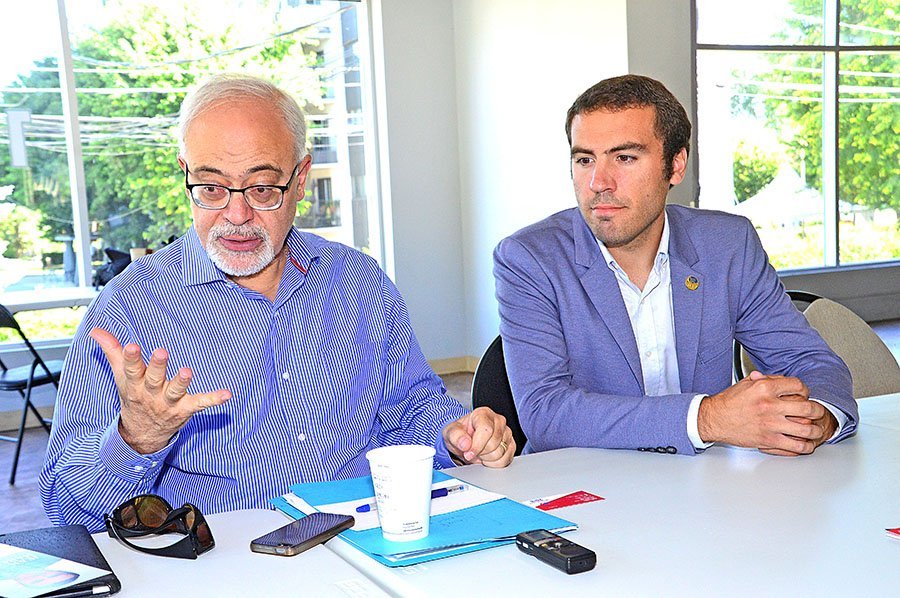
Martin C. Barry
During a pre-election campaign stop in Laval last week to lend support to Sainte-Rose Liberal MNA Jean Habel, Quebec Finance Minister Carlos Leitão sounded a warning about the potential impact on the province’s English-speaking community from the Coalition Avenir Québec’s plans to abolish school boards, while changing how Quebec collects school taxes.
Seemingly determined to make inroads in Laval where the region’s six National Assembly seats are currently held by the Liberals, CAQ leader François Legault has raised the issue of school taxes during recent visits to Laval, while reminding Laval residents that they pay higher school taxes than is often the case in other regions.
Region versus region
“He’s playing a dangerous game because he’s pitting regions against other regions,” said Leitão, while maintaining that the school tax issue is complex. “We proceeded with a reform that we announced in the last budget, which was to create a unified tax rate for every region,” he said.
Leitão acknowledged that because there was a big imbalance between school boards, mainly English and French school boards within the same regions, there were some issues here in Laval particularly “where you had one house on one side of the street paying a certain tax rate” while another house just next door “paid a different tax rate just because you go to an English school board or a French school board.
Addressing an imbalance
“That was a huge imbalance and it was clearly unfair,” he continued. “So we proceeded with a reform to unify the tax rates within the region, so in Laval now everybody pays the same tax rate regardless of the school board, English or French, that they send their children to within each region.”
However, in the meantime, Leitão pointed out, CAQ leader Legault wants to go further by implementing a province-wide single tax rate, so that everybody in every single region will pay the same tax rate. “Two problems with that,” said the finance minister, noting this would cost the government several hundred million dollars (just as it did to implement the initial school tax reform).

Disagrees with CAQ proposal
“We think that there are perhaps other priorities where those $700 million could be put to better use,” he said. “So that’s one problem with his proposal. The second problem is that he says that by doing so it would address the issue of equity.
“Well, no, because the regions of Quebec are not uniform. Property values are not the same obviously everywhere. And I think to have one single tax rate province-wide doesn’t really address the differences in regions, the differences in real estate values, the differences in the kind of services that some of the school boards offer.”
CAQ would abolish boards
Habel said that when the governing Liberals pushed forward the school tax reform, Legault and the CAQ voted against several elements of the bill, while also noting that Legault and the CAQ have long advocated the outright abolition of the province’s system of school boards.
“That’s an issue that’s also very important,” said Leitão, “the fact that the Coalition Avenir Québec has only said several times that they would eventually abolish school boards.” Asked what are his concerns about such a move, Leitão responded:
“The English-speaking community is very attached to its school boards. And it’s not just some sort of emotional attachment. It’s very concrete, it’s very real, I mean, because it’s one way where the community can exercise some control over its institutions.”
Leitão defends school boards
Citing the experience of English-speaking constituents in his own riding of Robert-Baldwin on Montreal’s West Island, Leitão said Anglophone school boards there “are very active and parents’ groups have a great deal to gain from continuing to control the school boards. And if you look at the school board election turnouts at the Anglophone school boards, their participation rate is significantly higher.”
While admitting that the Liberal government back in 2014-15 flirted with the idea of shutting school boards, “we quickly moved away from that because of communities in the West Island and elsewhere in Quebec,” Leitão said. “Anglophone communities told us that they are very much attached to the school boards. And it makes sense. On top of all that also it would trigger all kinds of constitutional debates, which I don’t think is necessary to do that now.”



